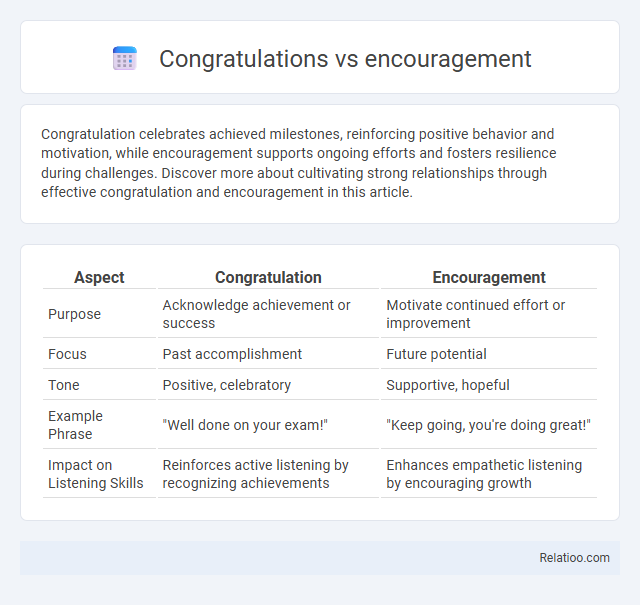Congratulation celebrates achieved milestones, reinforcing positive behavior and motivation, while encouragement supports ongoing efforts and fosters resilience during challenges. Discover more about cultivating strong relationships through effective congratulation and encouragement in this article.
Table of Comparison
| Aspect | Congratulation | Encouragement |
|---|---|---|
| Purpose | Acknowledge achievement or success | Motivate continued effort or improvement |
| Focus | Past accomplishment | Future potential |
| Tone | Positive, celebratory | Supportive, hopeful |
| Example Phrase | "Well done on your exam!" | "Keep going, you're doing great!" |
| Impact on Listening Skills | Reinforces active listening by recognizing achievements | Enhances empathetic listening by encouraging growth |
Understanding the Meaning: Congratulation vs Encouragement
Congratulation expresses recognition of an achievement or success, highlighting a moment of accomplishment, while encouragement aims to motivate and support ongoing effort or improvement without tying it to a specific outcome. Understanding the nuanced difference between congratulation and encouragement is essential for effective communication; congratulating emphasizes past success, whereas encouraging fosters future potential. Both serve distinct psychological roles: congratulation reinforces confidence through acknowledgment, and encouragement promotes resilience and perseverance in the face of challenges.
Key Differences Between Congratulation and Encouragement
Congratulation expresses recognition of an achievement or success, highlighting past accomplishments, while encouragement motivates and supports ongoing efforts or future challenges. You use congratulation to affirm completed milestones, whereas encouragement boosts confidence and perseverance during the process. Understanding this distinction ensures your communication appropriately celebrates success versus inspiring continuous growth.
When to Use Congratulation
Use "congratulation" when acknowledging someone's accomplishment or success, such as a graduation, promotion, or achievement in a competition. This term is appropriate in formal and informal contexts to express praise for a specific milestone reached by an individual or group. Avoid confusing it with "encouragement," which is meant to motivate or support someone before or during challenges rather than celebrating completed successes.
When to Offer Encouragement
You should offer encouragement when someone is facing challenges, working toward goals, or experiencing setbacks, as it supports motivation and resilience. Congratulation is best reserved for acknowledging achievements and successes after a task is completed or a milestone is reached. Encouragement helps maintain momentum during the process, while congratulation celebrates the outcome.
Emotional Impact of Congratulation
Congratulation carries a powerful emotional impact by validating Your achievements and fostering a sense of pride and joy. Unlike encouragement, which motivates future efforts, congratulations celebrate specific successes and reinforce positive self-esteem. This recognition helps strengthen relationships and boosts confidence, making it a vital response in personal and professional settings.
Motivational Power of Encouragement
Encouragement holds a unique motivational power by actively inspiring individuals to continue their efforts and overcome challenges, unlike congratulation which acknowledges past achievements without necessarily fueling future progress. While congratulations celebrate success, encouragement fuels perseverance and growth by affirming your potential and resilience. Embracing encouragement can transform setbacks into stepping stones, making your journey toward goals more sustainable and empowering.
Examples of Congratulation in Everyday Life
Congratulation expressions commonly appear in everyday life during significant milestones such as graduations, job promotions, and weddings, where phrases like "Congratulations on your promotion!" or "Congrats on your graduation!" are frequently used. These examples highlight positive recognition of achievements, distinguishing congratulations from encouragement, which focuses on motivating future efforts, and sympathy, which expresses support during difficult times. Using targeted congratulatory messages fosters social bonds and reinforces success celebrations within personal and professional settings.
Practical Ways to Encourage Others
Practical ways to encourage others include offering specific praise, recognizing their efforts, and expressing genuine belief in their potential. Congratulation is best reserved for celebrating achievements, while encouragement focuses on motivating ongoing progress and resilience during challenges. Your supportive words can significantly boost someone's confidence and drive future success.
Common Mistakes: Mixing Up Congratulation and Encouragement
Mixing up congratulation and encouragement often occurs because both express positive feedback but serve different purposes: congratulation celebrates a specific achievement, while encouragement motivates ongoing effort. Common mistakes include using congratulation when trying to inspire future actions or giving encouragement when acknowledging a completed success. Clear distinction improves communication by ensuring recipients feel appropriately recognized or motivated based on the context.
Choosing the Right Words: Enhancing Personal and Professional Relationships
Choosing the right words, such as "congratulation," "encouragement," or "congratulation," plays a crucial role in enhancing personal and professional relationships by conveying appropriate emotions and intentions. Congratulation expresses recognition and celebration of achievements, while encouragement motivates continued effort and resilience during challenges. Understanding the context and emotional tone enables effective communication that fosters trust, support, and positive connections.

Infographic: Congratulation vs Encouragement
 relatioo.com
relatioo.com